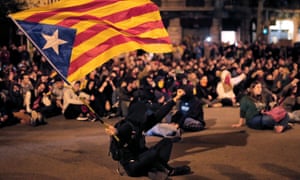Spanish state repression in Catalonia may be shocking – but it’s nothing new

The Spanish supreme court’s deeply unjust verdict, handing out harsh prison sentences to nine Catalan government and civil society leaders for organising a peaceful referendum on self-determination in Catalonia, is for many the sign of a country slipping towards authoritarianism and away from western European-style democracy. But truth be told, for us Basques, this kind of behaviour is nothing new.
For years Spain was able to disguise its undemocratic essence under the cloak of the “fight against Basque terrorism”. Denial and rejection of the political nature of the armed conflict in the Basque country became quite easy for them, especially after 9/11. The line was that there was not a political problem in Spain, just a criminal one. “Spain is a democracy,” they used to tell us. “Everything is possible without violence” was the repeated mantra. We still remember the words of Spanish home secretary Alfredo P Rubalcaba: “They must decide: bombs or votes.”
Yet when some of us in the pro-independence Basque movement began to convince those who still believed in violence to continue our struggle for self-determination by peaceful and democratic means, we were arrested and sentenced to lengthy jail terms.
The truth is that Basque violence ended –not thanks to Spanish government efforts – but in spite of its persistent obstructions. (It is probably important here to clarify my position: many wrongs were done by the Basque side, many things happened that should not have done. We have acknowledged our share of the blame for the violence that was committed by both sides during years of conflict). My arrest – along with others – happened 10 years before the Catalan politicians were convicted of sedition, and it was only after we had served our prison term that the European court of human rights ruled our trial had been unfair (the second time the ECHR had ruled against Spain). The same could easily happen to the Catalans. The fact that the Spanish state still holds more than 240 Basque political prisoners in jail despite ETA ending its armed campaign in 2011 shows its lack of interest in a lasting peace.
The verdict against the Catalan pro-independence leadership for organising a democratic and peaceful referendum, and the subsequent violence the Spanish police used against peaceful Catalan demonstrations, shows us what we always knew: the Spanish state is not interested in democracy and will use violence to conceal its undemocratic nature.
This is why the state plays up, and at times instigates, violence in the region. The Spanish media and courts have even started talking about “terrorism” in the Catalan case. Spain will not hesitate to use this lie. Its government would love to transform Catalans’ legitimate and peaceful demand for self-determination into violence. That is what the police and military forces have been trying to do the last few days with their violent tactics.
Fortunately, the Catalan nationalist movement is committed to peace. As we are in the Basque country. We know that our “force of reason” is stronger than their “reason of force”. At the same time we both are committed to achieving our fundamental democratic rights – Catalan and Basque demands for democracy will now only get louder. It is time to complete the unfinished business of Spain’s phoney transition to democracy – and there will not be real democracy in Spain until its plurinational character is recognised, just as in the UK or Canada.
Rather predictably, Spain is going in the opposite direction: the direction of authoritarianism, counter-reform, the recentralisation of powers and responding to democratic demands with an iron fist. All this gives wings to the fascist extreme right. History shows us where this leads in the end.
Repression, imprisonment and centralisation will not work. Like in most similar cases around the world there is no lasting solution to this kind of conflict without dialogue. Like in Northern Ireland, Scotland or Quebec, the only way to solve these tensions is through democracy. And anyone with a bit of political sense knows that the state needs to engage with legitimate Catalan representatives. A policy of repression with no talks and no negotiation is unacceptable.
All the while, European institutions and states look the other way. Other European governments should be encouraging Spain to change track. Yet at the moment a desire to maintain internal stability within the bloc trumps all, and that means blind loyalty to Spain. This conflict can only be resolved internationally – European institutions and states should raise their voices in favour of a negotiated solution, before it is too late.
• Arnaldo Otegi is the leader of the Basque independence party EH Bildu





.jpeg)
Comments
Post a Comment